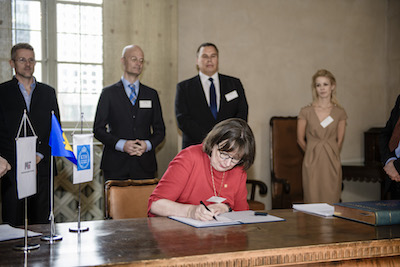Cooperation with MIT aims for less segregated, more humane Stockholm

Reducing segregation, developing water and energy resources and improving transport are some of the aims behind a new cooperation agreement signed last week between Massachusetts Institute of Technology (MIT) and KTH Royal Institute of Technology.
“This is a unique collaboration and with two top universities,” said Stockholm Mayor Anna König Jerlmyr, during signing festivities at Stockholm City Hall. “There is no limit to what we can achieve.”
Researchers in urban planning and urban development from KTH and MIT will together address the challenges facing a growing city with the help of AI and big data.
The researchers will use Stockholm – as well as its residents – as a test bed. The hub for the research will be KTH-MIT Senseable Stockholm Lab . The collaboration also includes Stockholm City, Stockholm's Chamber of Commerce and Newsec.
“KTH and MIT fit perfectly together. We have the same DNA and approach to developing and improving society through research,” said Carlo Ratti, the MIT professor responsible for the collaboration with MIT.
He points out that a crucial ingredient is to use technology to get Stockholmers to participate in the research. This will be done partly through communication via digital and social networks, and partly because the results will be shared and be made available.
Ratti points to four cities whose attributes could be combined to realize an ideal city: Singapore for its mobility, Boston because of the involvement of citizens in planning, Milan for investment in green space and Stockholm as a hub of innovation and startups.
Muriel Beser Hugosson, who leads the KTH cooperation in KTH-MIT Senseable Stockholm Lab, reminded the audience of Sweden’s long tradition of open and accessible data. This corresponds today to digital data, "the internet of everything", which can be used in research to create a modern and attractive city.

For KTH President Sigbritt Karlsson, who co-signed the KTH-MIT agreement, the three most important qualities of a humane city are openness, livability and “warm people in between”.
“It is amazing that this project is now a reality. I look forward to the results and feel both proud and humble regarding this cooperation.”
Jill Klackenberg

